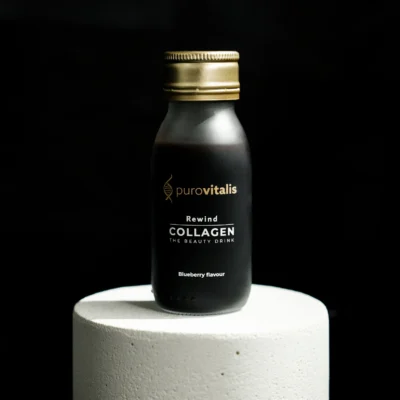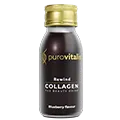
table of contents
Mechanics of stress
Stress doesn’t just affect your mood – it can influence how quickly you age. Research shows that chronically elevated cortisol, the body’s main stress hormone, is linked to everything from wrinkles and inflammation to impaired mitochondrial function and even early menopause. This is sometimes referred to as stress age syndrome. It’s important to distinguish between stress and oxidative stress — two separate processes. Oxidative stress involves cellular damage from free radicals, while stress here refers to hormonal and neurological responses. Both can impact how we age and how long we stay healthy.
Stress age syndrome
Describes the biological changes caused by chronic stress that accelerate aging. It involves long-term disruptions in hormones, damage to cells, and tissue deterioration, which together increase the risk of earlier physical decline, cognitive problems, and age-related diseases.
Acute vs chronic stress
Stress is a natural biological reaction — and not always a bad one. Acute stress is short-term and often resolves quickly. It’s what you feel in a high-pressure situation, like speaking in public or responding to a near-miss while driving. Your body releases cortisol and adrenaline, but once the moment passes, your system resets.
Chronic stress, unlike short-term stress, is ongoing and doesn’t allow the body time to recover. It can stem from work pressure, family responsibilities, emotional strain, or a combination of factors — and over time, it can have a significant impact on the body’s internal balance. When cortisol levels remain elevated for too long, it disrupts hormonal balance, impairs mitochondrial function, and accelerates biological processes linked to stress and aging. Chronic stress has been associated with premature aging, inflammation, oxidative stress, and visible skin changes such as wrinkles.
Chronic stress can leave lasting marks on the body and mind, and its role in cortisol and aging, stress epigenetics, and healthspan is an active area of research.
In other words
While acute stress is a normal and often helpful part of life, chronic stress wears the body down over time — making it one of the most significant hidden drivers of early aging.
The role of cortisol in aging
Cortisol plays a complex role in the relationship between stress and aging. In healthy amounts, it regulates blood pressure, metabolism, and inflammation, and follows a natural rhythm — peaking in the morning and declining at night. But when cortisol levels stay elevated for too long, as seen in chronic stress, the body shifts out of balance.
Does cortisol age you? Research suggests it can. Long-term cortisol elevation is linked to hormonal disruption, mitochondrial dysfunction, and inflammation — key features of cortisol in aging and stress inflammation and aging. It may also contribute to skin aging, telomere shortening, and epigenetic changes that alter how cells repair and replicate.. Some studies also suggest it may increase the risk of early menopause and contribute to changes in brain function and other degenerative conditions related to aging.
Stress and aging
As we know by now chronic stress affects the body on a deep level and can trigger biological processes that accelerate aging. Hormonal imbalances, fatigue, and reduced cellular function are common signs – yet breaking out of stressful routines can be difficult, even when the consequences are clear.
Many people stay stuck in patterns that harm both their health and long-term well-being. The body sends signals like restlessness, poor sleep, headaches caused by hormonal imbalance, skin changes, trouble concentrating, and many other symptoms that can arise from prolonged stress. But it takes energy to listen and act.
Supplements like NMN support mitochondrial resilience, while resveratrol and quercetin help counteract inflammation, aging, and oxidative stress. Combined with lifestyle changes, they may support stress and longevity by protecting the body from aging due to stress and the effects of cortisol and aging over time. Keep on reading for some more helpful tips.
Related: Understanding inflamm-aging: Age and Inflammation
Stress and brain aging
Chronic stress leaves a mark on the brain. Prolonged exposure to cortisol affects areas like the hippocampus, which is essential for memory and learning. Research shows that both cortisol and glutamate disrupt communication between brain cells, reduce the formation of new connections, and lead to structural changes.
Over time, this can contribute to cognitive decline, emotional imbalance, and increased disease risk. According to the study, chronic activation of stress systems leads to allostatic overload — a buildup of biological strain that affects not just the brain, but also immunity, metabolism, and the pace of aging.
Stress and menopause
Stress doesn’t just mess with your mood — it might also affect when menopause starts. A large Korean study showed that women who felt highly stressed in everyday life tended to reach natural menopause about five months earlier than those with lower stress. Researchers believe that long-term stress and high cortisol levels may throw off hormonal balance and speed up the natural decline in ovarian function. While more research is needed to fully understand the link, this suggests that stress and aging also apply to reproductive health. Reducing stress and supporting your body with sleep, nutrients, and self-care may help ease the transition.
Related: NMN: A Potential Supplement for Age-Related Fertility
Stress and skin aging
Chronic stress also shows on the skin. A recent study confirms that persistently high cortisol levels cause wrinkles, oxidative stress, and skin aging. Women with moderate psychological stress had 32.9% more fine lines, a weaker skin barrier, and 12% lower antioxidant protection compared to mildly stressed women. Cortisol also reduced collagen production and made it harder for the skin to heal and stay hydrated.
To support the skin from within, Purovitalis Rewind Liquid Collagen offers more than just collagen — it contains seven carefully selected ingredients that help maintain skin health and structure, even during stressful periods. See the full ingredient list and how it works here.
Related: Bovine collagen peptides – types, benefits and safety
Can stress-driven aging be reversed?
A study from 2023, conducted by researchers at Harvard and Brigham and Women’s Hospital, shows that biological age is not a fixed value, but something that can change quickly in both directions. Using epigenetic aging markers, the researchers examined how different forms of stress – such as major surgery, pregnancy, and severe COVID-19 – temporarily increase biological age. However, when the body has time to recover, biological age often returns to baseline.
One particularly interesting finding relates to pregnancy. Measurements showed that biological age increased during pregnancy but declined again after childbirth and the body’s natural recovery. This suggests that even longer periods of stress do not necessarily leave lasting marks on aging, as long as the body is allowed to heal. It offers new hope that biological aging is not inevitable – but something that, in some cases, may be reversible.
Summary
Accelerated aging due to chronic stress might not be permanent and may be at least partially reversible once the stressor is removed and the body has the time and right conditions to recover.
Controlling stress and reversing aging
Even after longer periods of pressure, the body has an incredible ability to recover — if we give it the right support. That’s why it’s hopeful to see research suggesting that the effects of stress aren’t always lasting. With the right conditions in place, the body can gradually restore balance and resilience.
This raises an important question: If stress can speed up aging, what can we do to reduce its impact — and how can we support the body in recovering after a stressful period?
Fortunately, the body is not passive in this process. It has built-in systems designed to restore balance. With consistent focus on sleep, movement, nourishment, and a supportive daily environment, we can help regulate the body’s stress response. Over time, these steady habits don’t just improve how we feel — they may also help reverse some of the biological effects of stress and contribute to healthier aging overall.
A good place to start
Identify what triggers the stress you experience over time. Once you understand what weighs you down in daily life — whether it’s lack of sleep, work pressure, unpredictability, or too few breaks — it becomes easier to figure out what’s needed to restore balance and give your body the best conditions to recover.
Lifestyle changes
Stress often builds up in environments that drain you — whether it’s a high-pressure job, toxic relationships, or a daily routine that leaves no time to recharge. Identifying and changing the sources of chronic stress is a powerful first step. That might mean setting firmer boundaries at work, reducing time with negative people, or simplifying your schedule. Even small lifestyle shifts, like taking short breaks or saying no more often, can reduce daily stress load. Creating a home environment that feels calm, supportive, and safe helps lower cortisol naturally. You don’t have to quit your job or move to a cabin — but removing what constantly drains you is just as important as adding new healthy habits.
Get active
Physical activity is one of the most effective and immediate ways to lower stress. When you move, your body releases endorphins that boost your mood and help counteract cortisol — the main stress hormone linked to cortisol and aging. Regular exercise also improves sleep, balances hormones, and supports brain and mitochondrial health. The best part? You don’t need intense workouts. A daily walk, dancing, gardening, or gentle strength training all count. The key is consistency. Over time, being active doesn’t just reduce stress — it helps your body become more resilient. Find movement you enjoy, make it part of your routine, and let it become your natural anti-stress reset.
Anti-stress diet
What you eat has a big impact on how your body handles stress. A balanced, anti-stress diet helps regulate blood sugar, reduce inflammation, and support brain and hormone function. A stress-supportive diet also plays an important role in managing aging, oxidative stress and dietary antioxidants. Nutrients that strengthen the body’s antioxidant defenses can help reduce the cellular damage linked to chronic stress and aging.
Focus on whole, unprocessed foods rich in antioxidants, healthy fats, fiber, and magnesium. Reduce stimulants like caffeine and sugar, which can spike cortisol. Regular meals and hydration keep your energy stable and mood more even.
Here’s a quick overview of foods that help support a calm, stress-resilient body:
| Helpful Foods | Why |
|---|---|
| Leafy greens | High in magnesium and antioxidants |
| Fatty fish (e.g., salmon) | Omega-3s reduce inflammation |
| Berries | Rich in vitamin C and polyphenols |
| Whole grains | Support serotonin production |
| Fermented foods | Improve gut health and mood |
| Avocados | Provide healthy fats and B vitamins |
| Chamomile tea | Naturally calming and supports sleep |
Practice breathwork and mindfulness
Breathwork and mindfulness are simple yet powerful tools to calm the stress response. Slow, conscious breathing activates the parasympathetic nervous system — helping lower cortisol, steady your heart rate, and shift your body out of ‘fight or flight’ mode. A 2023 study shows that breathwork—especially slow-paced breathing—can reduce stress, anxiety, and depression with a small to moderate effect. The technique is safe, easy to learn, and has the potential to become an accessible method for supporting mental well-being.
Related: The health benefits of breathwork
Supplements that reduce stress and slow down aging
Alongside food, sleep, and lifestyle changes, certain supplements can help your body cope with chronic stress and support healthy aging from the inside out. Some ingredients actively counteract inflammation, oxidative stress, and hormone imbalances — all drivers of stress-related aging. As mentioned earlier, Purovitalis Rewind Liquid Collagen is one example. It contains not just collagen, but seven carefully selected ingredients that help support skin structure, hormonal balance, and cellular repair, even during high-stress periods.
Other longevity supplements, like NMN, support mitochondrial function, which often suffers under chronic stress. Healthy mitochondria are essential for energy, resilience, and cellular repair — all crucial for slowing biological aging. Spermidine and Calcium AKG may also support stress resilience and cellular cleanup processes linked to longevity.
While supplements aren’t magic pills, they can offer real support when combined with sleep, movement, and a nutrient-rich diet. The goal isn’t to eliminate stress entirely — that’s not realistic. But by giving your body the tools to recover and adapt, you may slow down the wear-and-tear that comes with long-term cortisol elevation. For many, adding targeted longevity supplements is a practical next step in managing stress and supporting healthy aging over time.
References
- Polsky LR, Rentscher KE, Carroll JE. Stress-induced biological aging: A review and guide for research priorities. Brain Behav Immun. 2022 Aug;104:97–109. doi:10.1016/j.bbi.2022.05.016
- Choi BO, Lee YJ, Choi JH, Cho SW, Im HJ, An JE. The association between stress level in daily life and age at natural menopause in Korean women: outcomes of the Korean National Health and Nutrition Examination Survey in 2010–2012. Korean J Fam Med. 2015 Nov;36(6):305–9. doi:10.4082/kjfm.2015.36.6.305
- McEwen BS. Neurobiological and systemic effects of chronic stress. Chronic Stress (Thousand Oaks). 2017 Apr 10;1:2470547017692328. doi:10.1177/2470547017692328. PMID: 28856337; PMCID: PMC5573220
- Pujos M, Chamayou‐Robert C, Parat M, Bonnet M, Couret S, Robiolo A, et al. Impact of chronic moderate psychological stress on skin aging: exploratory clinical study and cellular functioning. J Cosmet Dermatol. 2024 Nov 6;24(1):e16634. doi:10.1111/jocd.16634. PMID: 39506493; PMCID: PMC11743297
- Fincham GW, Strauss C, Montero-Marin J, Cavanagh K. Effect of breathwork on stress and mental health: A meta-analysis of randomised-controlled trials. Sci Rep. 2023 Jan 9;13:432. doi:10.1038/s41598-022-26648-3
- Poganik JR, Zhang B, Baht GS, Tyshkovskiy A, Deik A, Kerepesi C, et al. Biological age is increased by stress and restored upon recovery. Cell Metab. 2023 May 2;35(5):807–820.e5. doi:10.1016/j.cmet.2023.03.015

Experience the best of Collagen with Purovitalis liquid formula. Try it out!

longevity tips best exercises nutrition diets healthy lifestyle
The art of living well a life that’s not measured by years alone, but by experiences, health, and joy!













